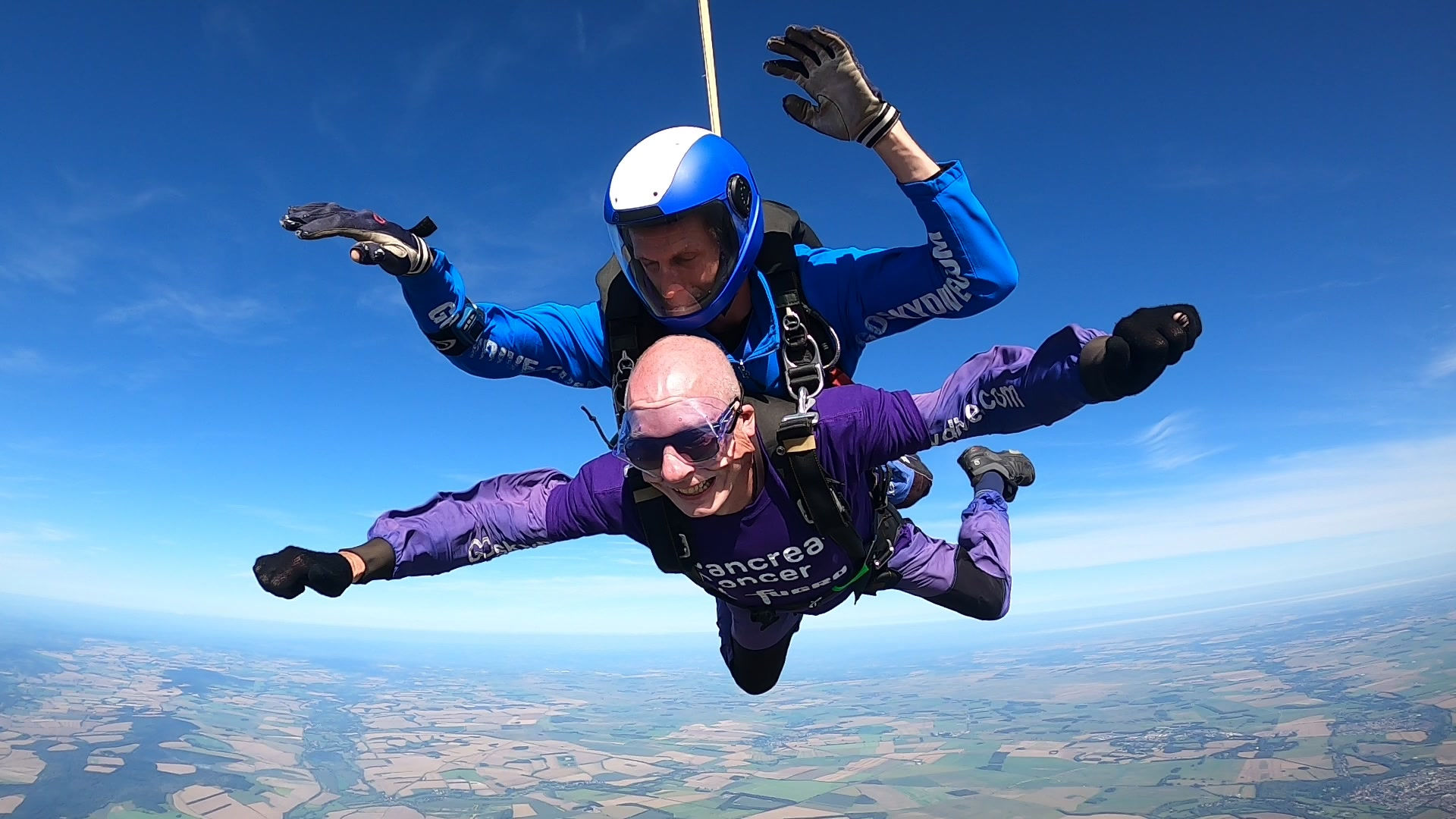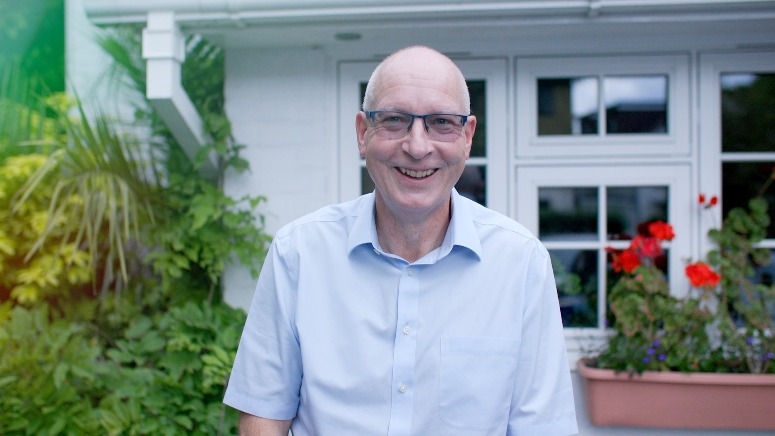Advanced radiotherapy for pancreatic cancer
Treatment options for pancreatic cancer vary for each person depending on how far their cancer has spread and their general health, but all too often the outcomes are poor. This has to change.
MRIdian radiotherapy is emerging as a promising treatment. A recent study found people with inoperable pancreatic cancer that hasn’t spread to other organs lived 26 months on average when treated on the MRIdian,2 which is twice as long as expected with standard treatment.
We’re proud to be the first healthcare provider in the UK to offer MRIdian radiotherapy for people with inoperable pancreatic cancer, with treatment starting within 5 days of referral.
MRIdian can also be used to treat pancreatic cancer when it has spread to a small number of other areas of the body, such as liver, lung or lymph nodes
Watch Charles’ story here.
Dr James Good took up my case to see whether the technology of the MRIdian could do the job no other treatment could.
Charles, MRIdian MR linac pancreatic cancer patient
State-of-the-art treatment
MRIdian gives doctors three extra tools to target tumours more effectively.
- They can see the tumour while it’s being treated with much greater clarity than on standard radiotherapy machines.
- They can switch the radiation beam off when the tumour is not in the right position, making treatment much more targeted.
- They can adapt to any changes in the patient’s anatomy between treatment sessions. These three advances mean that a higher dose can safely be delivered, which evidence suggests can lead to longer survival than previously.
Our expert pancreatic cancer consultants work closely with advanced radiotherapy practitioners to deliver this state-of-the-art treatment to people with inoperable tumours.
Want to know more?
MRIdian radiotherapy is exclusively available in the UK at our outpatient centres in Oxford and Cromwell Hospital in London. Your cancer specialist can refer you for a consultation, or you can contact us directly. We’re recognised by all major insurers, and we offer self-pay options.
Charles' story
Charles was diagnosed with pancreatic cancer in March 2019. After surgery and 6 months of chemotherapy, he had regular follow-up scans. At the beginning of 2020 his clinician noticed his cancer had spread to a lymph node close to his aorta, a large blood vessel in his abdomen. The position of the tumour meant his treatment options were extremely limited.
Charles was referred to Dr James Good at GenesisCare in Oxford and received 5 radiotherapy sessions on the MRIdian over the course of 2 weeks. He was delighted to see his cancer go into remission.
Life with pancreatic cancer
This innovative treatment has since given Charles 18 months of remission and he’s been making every day count! He’s flown a Spitfire, visited Niagara Falls, and skydived to raise money for Pancreatic Cancer UK
Strong enough for chemotherapy
When Charles’ doctors discovered new tumours in April 2022, he was in a great position health-wise for chemotherapy. He credits the minimally invasive radiotherapy on the MRIdian for making it possible to take on further rounds of chemotherapy and have a good quality of life.
Looking to the future
Charles is planning to tick off even more of his bucket list. He’s off to Antigua for a couple of weeks, planning to fly an ex-Military Strikemaster jet, taking a holiday in the Maldives and will continue to raise awareness of the importance of early diagnosis and the treatments available which could improve the lives of others.

MRIdian gives us the confidence to treat challenging tumours, like those in the pancreas, with the higher doses of radiation needed to achieve better outcomes.
Dr James Good, Clinical director of stereotactic radiotherapy at GenesisCare
MRIdian radiotherapy for pancreatic cancer

Learn more about MRIdian radiotherapy for pancreatic cancer, including how it works and side effects.
Over 174 pancreatic cancer patients treated on the MRIdian in the UK
Since bringing MRIdian radiotherapy to the UK in December 2019, we've treated 174 people with inoperable pancreatic cancer - and counting.
The possibility of retreatment
Although all cancer treatments can have side effects, the accuracy of the MRIdian means we can safely deliver higher radiation doses without damaging normal tissues.
MRIdian radiotherapy means fewer treatment sessions, minimal side effects and the possibility of retreatment. In a small number of cases, it can reduce pancreatic tumours enough to be operated on.
Most people with pancreatic cancer will need to revisit treatment in the future, and MRIdian radiotherapy can give people more time to live well while keeping treatment options open.
Our consultants are experts in MRIdian radiotherapy and review every referral to create personalised treatment plans for the best possible life outcomes.
Why choose GenesisCare?
We’re the leading provider of private cancer care in the UK, offering the latest innovations and techniques that are proven to be safe and effective. Our team of experts include consultant pancreatic oncologists and advanced radiotherapy practitioners, who design personalised care plans based on individual diagnosis and preferences, with treatment starting within days. We support people through their cancer journey with wellness support in our unique partnership with the national charity, Penny Brohn UK.
FAQs
What are the symptoms of pancreatic cancer?
Getting an early diagnosis of pancreatic cancer often means treatment options and outcomes are much better.
- Stomach or back pain
- Yellowing of the skin (jaundice)
- Unexplained weight loss
- Changes to your bowel movements
- Tiredness
- Indigestion and/or weight loss
- Nausea
- New-onset diabetes
- Itching
- Fever and shivering
- Blood clots (DVT)
Not everyone will have these symptoms and you might not have them all. If you notice any of the symptoms above, see a doctor as soon as possible.
References
1. Pancreatic Cancer. Why we’re taking on the toughest cancer [Available from: https://www.pancreaticcancer.org.uk/what-we-do/our-impact-together/why-pancreatic-cancer-is-the-toughest-cancer/. Accessed on: 16 Oct 2023
2. Chuong, M. D. Long-Term Multi-Institutional Outcomes of 5-Fraction Ablative Stereotactic MR-Guided Adaptive Radiation Therapy (SMART) for Inoperable Pancreas Cancer With Median Prescribed Biologically Effective Dose of 100 Gy10. International Journal of Radiation Oncology, Biology, Physics. 2021;111(3): S147-S148. Available: https://doi.org/10.1016/j.ijrobp.2021.07.330
